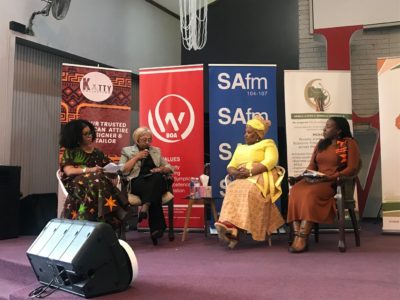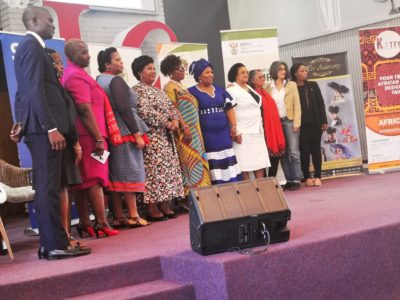The Africa for Africa Women’s conference on Africa’s Transformational Leadership Summit hosted in Cape Town from the 30th of September to the 1st of October was a firm reminder that there is a lot of work that needs to be done to address the status quo that has been set by society and institutions regarding gender roles in the work place. The Summit saw representatives from government, private sector and civil society converge to discuss and engage on how the issues of gender equality can be addressed. Through the various presentations, there are some great examples that show the extent some companies are striving to address the gender gaps that exist. Below are some glaring issues that were shared by various speakers:

- Gender Equity is possible – but how do we deinstitutionalise masculinity?
The South African Department of Labour Chief Director of Human Resources Ms. Ntombekhaya Qamata highlighted that employment equity is still a huge challenge in South Africa. Statistics show that there is still a 27% gender pay gap in South Africa. There is a lot of evidence that shows that employers are still not taking employment equity seriously. Ms. Qamata noted that some South African companies are still underpaying and excluding women from senior leadership positions. Her closing remarks was a question: “How do we breakdown masculine role modelling that becomes toxic and dangerous for women in the work place?”
- We are key political players – we need to support each other as women
In a panel discussion that highlighted women’s participation in the political space, the key message was that women are key political players and need to elevate their power and influence to more strategic positions. One of the speakers, the Hon. Ms. Florence Mutua and member of Parliament from Kenya alluded to the fact that when politicians are mobilizing support they call on female political players to mobilize the women through what are called women’s leagues. The sad part is that the women’s leagues are never consulted when their needs are to be addressed.
Dr. Jessie Kabwila the Former Chair of the Regional Women’s Parliamentary Caucus in Malawi spoke about how women need to celebrate the capacity their fellow female politicians have and not judge them based on marital statuses, divorced or single. She affirmed that this did not determine women’s capabilities.
- Some are getting it right – but gender roles can be a limiting factor!
The Summit also had space for corporate organisation to share their feedback and input. One of the speakers at the Summit was Ms. Rachell Harmsey who is the head of human resources from Unilever. She celebrated that Unilever was one of those institutions that were is going an extra mile to ensure that there is no discrimination based on gender and age in her institution. She highlighted how salaries were determined by grades that were guided by one’s experience and knowledge in the field. The glaring gaps however emerge when women take gender roles such as maternity breaks away from work. This is when men begin to gain more career progress than women. She highlighted that her institution is doing its best in bridging this gap by creating an environment that allows women to bring their children to work so that they are better placed mentally to concentrate on their work.

- How do we distinguish between changing the narrative from gender equality to gender equity in the workforce?
During the sessions a recurring theme of gender equality versus gender was present. The South African Department of Labour Chief Director of Human Resources Ms. Ntombekhaya Qamata posed the question “How do we institutionalize gender equity?”. It is important to note that gender equality is not always the end goal, because it does not necessarily result in equal outcomes for both women and men.
Gender equity is more appealing because gender equity recognises different needs, constraints and aspirations disadvantaged employees may need.
It was encouraging to see a company as big as Nestle practice gender equity as representative, Ms. Nomuhlekhabo Tshabalala explained how the company provides breastfeeding rooms and children’s play rooms for mothers and their families. They prioritise physical and mental health for employees to function at their best, ensuring employees are taken care of as well as extending the care to their immediate families. These considerations optimise employee growth and development which other organisations should follow.

- How do women drive leadership with the odds against us?
The summit organiser, Dr. Bea Hackula emphasized how women as a collective need to drive the change we wish to see and transform our leadership. She quoted, “you lift as you rise” to highlight the importance of lifting other women once you reach the top and not fall in to the patriarchal system of competing against other women with potential. Dr Nothando Moyo , founder and executive chairman of Women Inspired, expressed the realities of women not working together with the analogy of a python and their cold blooded nature to suffocate and constrict growth. The take away is that we all have different gifts that can contribute to transforming leadership and growth in the quest for gender equality within the work place and in our broader realities. The hope is that the divide and conquer legacy against women’s progression is diminishing and we are moving towards a sisterhood mentality that will transform women’s realities.
Read more on Women’s Economic and Social Advancement programme










 The Trust supports and mobilises civil society networks on issues of ending child marriage, ending violence against children, ending female genital mutilation and promoting children’s rights, to carry out advocacy and action across Africa. Special focus is placed on Malawi, Mozambique, Tanzania and Zambia where child marriage continues to be a problem largely driven by poverty, gender inequality, harmful traditional practices, conflict, low levels of literacy, limited opportunities for girls and weak or non-existent protective and preventive legal frameworks.
The Trust supports and mobilises civil society networks on issues of ending child marriage, ending violence against children, ending female genital mutilation and promoting children’s rights, to carry out advocacy and action across Africa. Special focus is placed on Malawi, Mozambique, Tanzania and Zambia where child marriage continues to be a problem largely driven by poverty, gender inequality, harmful traditional practices, conflict, low levels of literacy, limited opportunities for girls and weak or non-existent protective and preventive legal frameworks.




 Education is a fundamental right for all children, which is also a vehicle for social, economic and political transformation in communities, countries and the African continent at large. Recent studies indicate a lack of progress in some of the critical commitments aimed at improving education quality, access, retention and achievement, particularly for girls. In most African countries, girls may face barriers to learning, especially when they reach post-primary levels of education. By implementing multi-dimensional approaches to education which includes core education, personal development, life skills and economic competencies, the Trust partners with funding partners, governments, civil societies and the private sector to improve education access.
Education is a fundamental right for all children, which is also a vehicle for social, economic and political transformation in communities, countries and the African continent at large. Recent studies indicate a lack of progress in some of the critical commitments aimed at improving education quality, access, retention and achievement, particularly for girls. In most African countries, girls may face barriers to learning, especially when they reach post-primary levels of education. By implementing multi-dimensional approaches to education which includes core education, personal development, life skills and economic competencies, the Trust partners with funding partners, governments, civil societies and the private sector to improve education access.

 The Nutrition and Reproductive, Maternal, New-born, Child and Adolescent Health and Nutrition, (RMNCAH+N) of the Children’s Rights and Development Programme aims at promoting the Global Strategy for women, children and adolescents’ health within the Sustainable Development Goals (SDG) agenda. The strategy emphasises on the importance of effective country leadership as a common factor across countries making progress in improving the health of women, children and adolescents.
The Nutrition and Reproductive, Maternal, New-born, Child and Adolescent Health and Nutrition, (RMNCAH+N) of the Children’s Rights and Development Programme aims at promoting the Global Strategy for women, children and adolescents’ health within the Sustainable Development Goals (SDG) agenda. The strategy emphasises on the importance of effective country leadership as a common factor across countries making progress in improving the health of women, children and adolescents. Through its Early Childhood Development (ECD) plan, The Trust will seek to put into action the new science and evidence Report that was presented by Lancet Series on Good and early development – the right of every child. This will be achieved by mobilising like-minded partners to contribute in the new science and evidence to reach all young children with ECD. The Trust’s goal is to be a catalyst for doing things differently, in particular, to rid fragmentation and lack of coordination across ECD sectors. In response to evidence showing the importance of political will in turning the tide against the current poor access and quality of ECD. Even before conception, starting with a mother’s health and social economic conditions, the early years of a child’s life form a fundamental foundation that determines whether a child will survive and thrive optimally.
Through its Early Childhood Development (ECD) plan, The Trust will seek to put into action the new science and evidence Report that was presented by Lancet Series on Good and early development – the right of every child. This will be achieved by mobilising like-minded partners to contribute in the new science and evidence to reach all young children with ECD. The Trust’s goal is to be a catalyst for doing things differently, in particular, to rid fragmentation and lack of coordination across ECD sectors. In response to evidence showing the importance of political will in turning the tide against the current poor access and quality of ECD. Even before conception, starting with a mother’s health and social economic conditions, the early years of a child’s life form a fundamental foundation that determines whether a child will survive and thrive optimally.